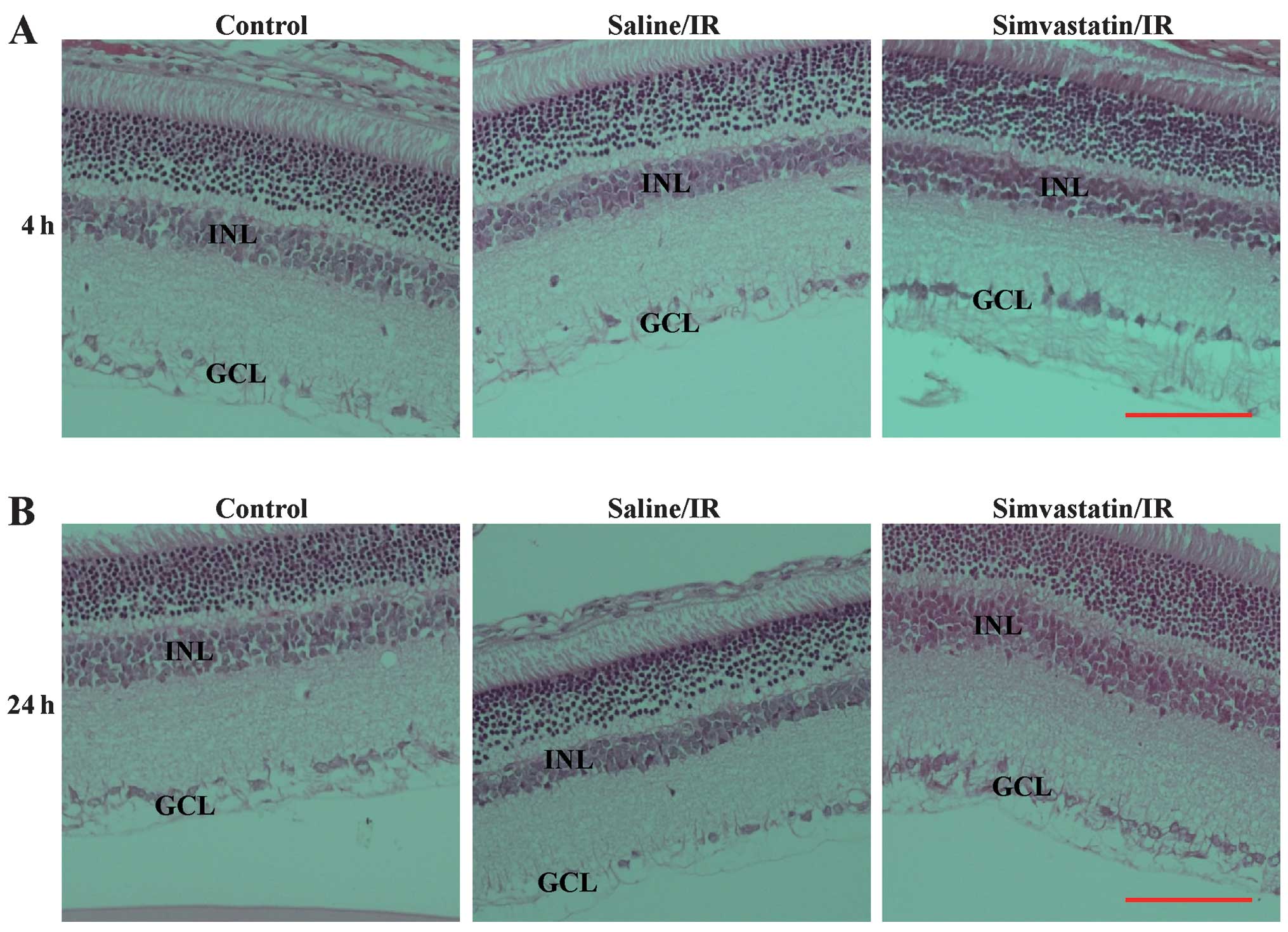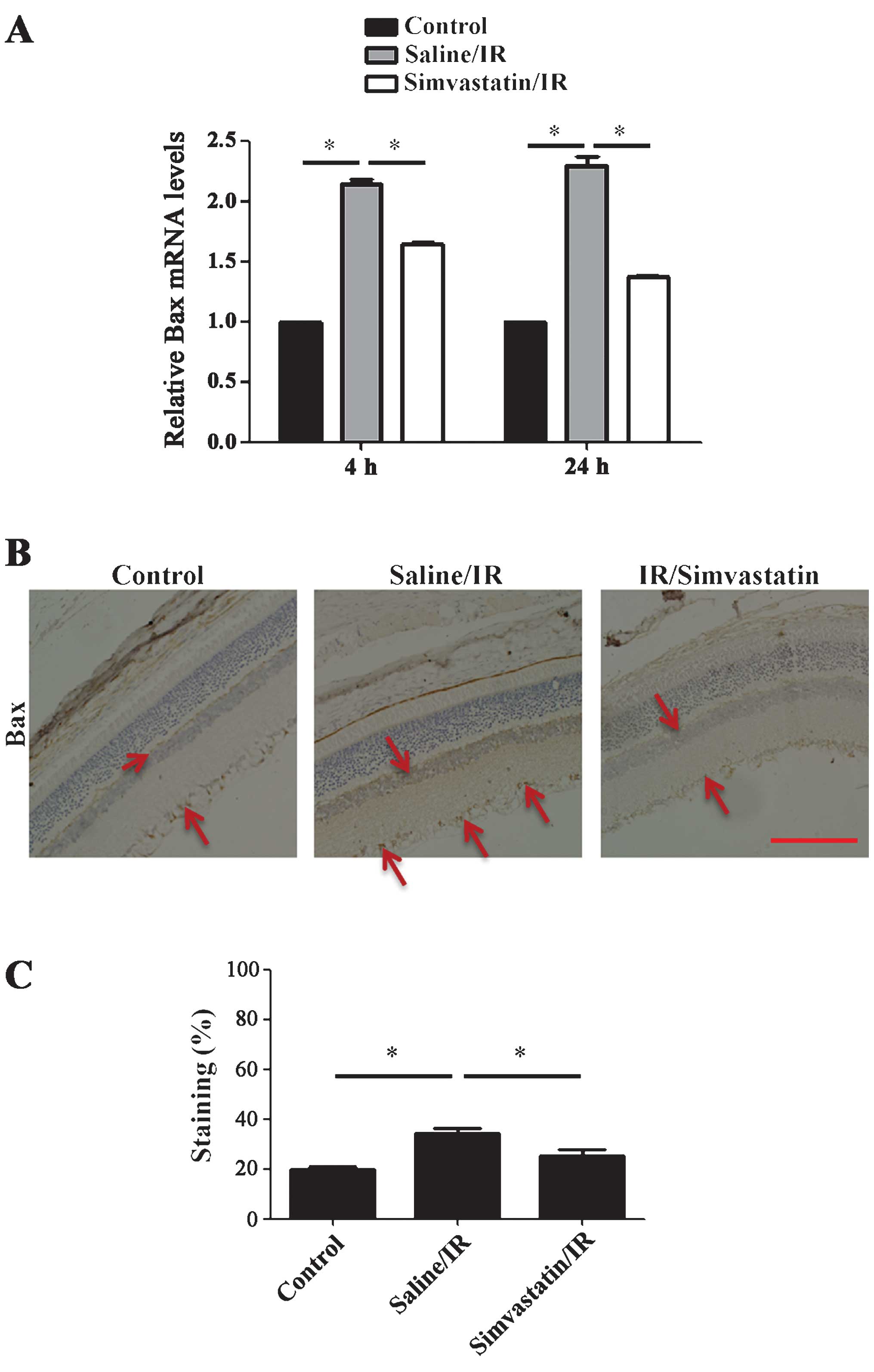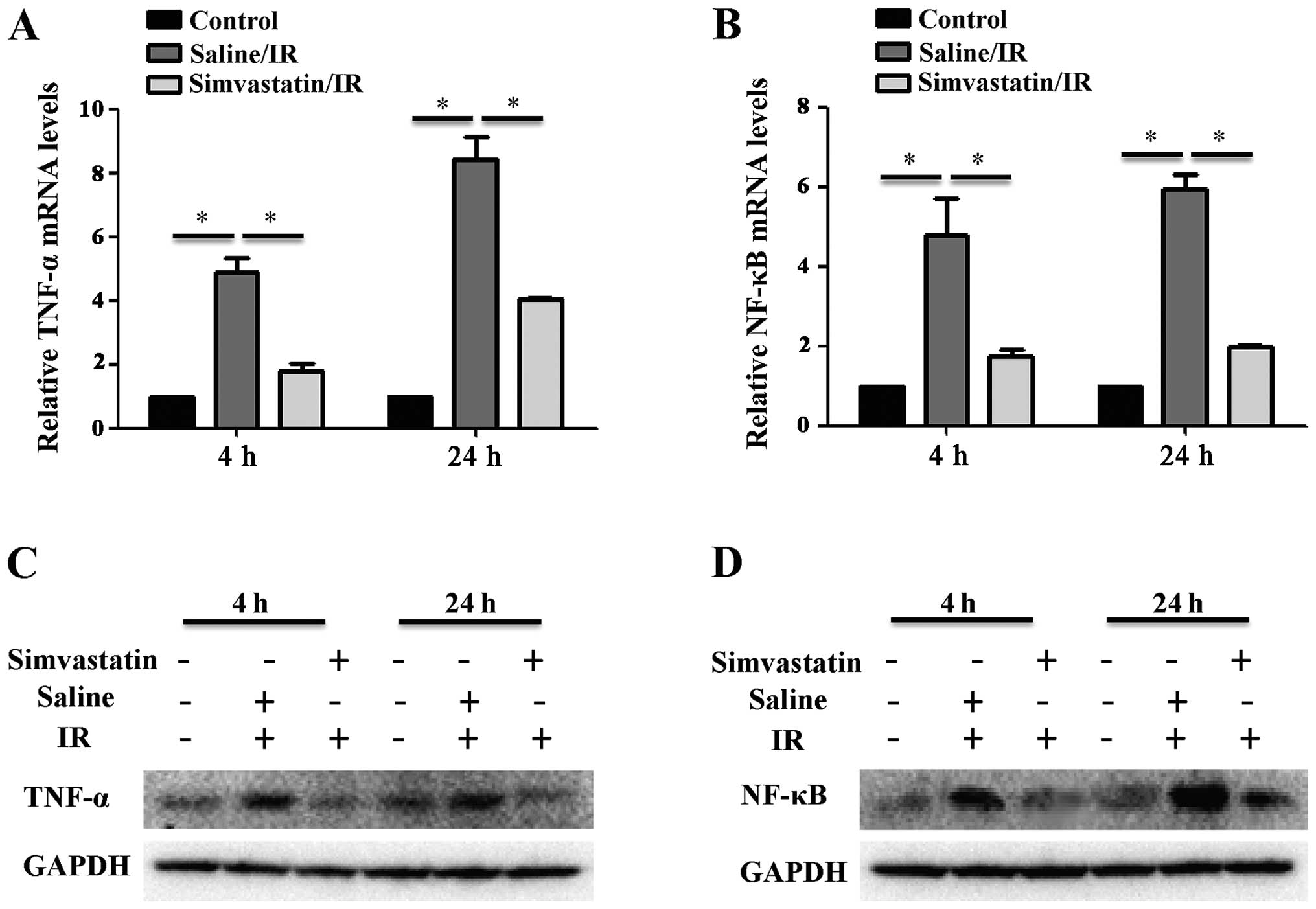|
1
|
Osborne NN, Casson RJ, Wood JP, Chidlow G,
Graham M and Melena J: Retinal ischemia: Mechanisms of damage and
potential therapeutic strategies. Prog Retin Eye Res. 23:91–147.
2004. View Article : Google Scholar : PubMed/NCBI
|
|
2
|
Rego AC, Santos MS and Oliveira CR:
Oxidative stress, hypoxia, and ischemia-like conditions increase
the release of endogenous amino acids by distinct mechanisms in
cultured retinal cells. J Neurochem. 66:2506–2516. 1996. View Article : Google Scholar : PubMed/NCBI
|
|
3
|
Goldblum D and Mittag T: Prospects for
relevant glaucoma models with retinal ganglion cell damage in the
rodent eye. Vision Res. 42:471–478. 2002. View Article : Google Scholar : PubMed/NCBI
|
|
4
|
Hardy P, Beauchamp M, Sennlaub F, Gobeil F
Jr, Tremblay L, Mwaikambo B, Lachapelle P and Chemtob S: New
insights into the retinal circulation: Inflammatory lipid mediators
in ischemic retinopathy. Prostaglandins Leukot Essent Fatty Acids.
72:301–325. 2005. View Article : Google Scholar : PubMed/NCBI
|
|
5
|
Wang H, Pan S, Yang X, Zhu B and Wang D:
Oxidative phosphorylated neurofilament protein M protects spinal
cord against ischemia/reperfusion injury. Neural Regen Res.
9:1672–1677. 2014. View Article : Google Scholar : PubMed/NCBI
|
|
6
|
Bhattacharya P, Pandey AK, Paul S, Patnaik
R and Yavagal DR: Aquaporin-4 inhibition mediates piroxicam-induced
neuroprotection against focal cerebral ischemia/reperfusion injury
in rodents. PLoS One. 8:e734812013. View Article : Google Scholar : PubMed/NCBI
|
|
7
|
Koç M, Kumral ZN, Özkan N, Memi G, Kaçar
Ö, Bilsel S, Çetinel Ş and Yeğen BÇ: Obestatin improves
ischemia/reperfusion-induced renal injury in rats via its
antioxidant and anti-apoptotic effects: Role of the nitric oxide.
Peptides. 60:23–31. 2014. View Article : Google Scholar : PubMed/NCBI
|
|
8
|
Ulbrich F, Schallner N, Coburn M, Loop T,
Lagrèze WA, Biermann J and Goebel U: Argon inhalation attenuates
retinal apoptosis after ischemia/reperfusion injury in a time- and
dose-dependent manner in rats. PLoS One. 9:e1159842014. View Article : Google Scholar : PubMed/NCBI
|
|
9
|
Lam TT, Abler AS and Tso MO: Apoptosis and
caspases after ischemia-reperfusion injury in rat retina. Invest
Ophthalmol Vis Sci. 40:967–975. 1999.PubMed/NCBI
|
|
10
|
Sellés-Navarro I, Villegas-Pérez MP,
Salvador-Silva M, Ruiz-Gómez JM and Vidal-Sanz M: Retinal ganglion
cell death after different transient periods of pressure-induced
ischemia and survival intervals. A quantitative in vivo study.
Invest Ophthalmol Vis Sci. 37:2002–2014. 1996.PubMed/NCBI
|
|
11
|
Nickells RW: Variations in the rheostat
model of apoptosis: What studies of retinal ganglion cell death
tell us about the functions of the Bcl2 family proteins. Exp Eye
Res. 91:2–8. 2010. View Article : Google Scholar : PubMed/NCBI
|
|
12
|
Ko ML, Chen CF, Peng PH and Peng YH:
Simvastatin upregulates Bcl-2 expression and protects retinal
neurons from early ischemia/reperfusion injury in the rat retina.
Exp Eye Res. 93:580–585. 2011. View Article : Google Scholar : PubMed/NCBI
|
|
13
|
Krempler K, Schmeer CW, Isenmann S, Witte
OW and Löwel S: Simvastatin improves retinal ganglion cell survival
and spatial vision after acute retinal ischemia/reperfusion in
mice. Invest Ophthalmol Vis Sci. 52:2606–2618. 2011. View Article : Google Scholar : PubMed/NCBI
|
|
14
|
Owens AP III, Byrnes JR and Mackman N:
Hyperlipidemia, tissue factor, coagulation, and simvastatin. Trends
Cardiovasc Med. 24:95–98. 2014. View Article : Google Scholar :
|
|
15
|
Stein A, Stroobants S, Gieselmann V,
D’Hooge R and Matzner U: Anti-inflammatory therapy with simvastatin
improves neuroinflammation and CNS function in a mouse model of
metachromatic leukodystrophy. Mol Ther. Apr 21–2015.Epub ahead of
print. View Article : Google Scholar : PubMed/NCBI
|
|
16
|
Leite CF, Marangoni FA, Camargo EA, Braga
AF, Toro IF, Antunes E, Landucci EC and Mussi RK: Simvastatin
attenuates neutrophil recruitment in one-lung ventilation model in
rats. Acta Cir Bras. 28:245–250. 2013. View Article : Google Scholar : PubMed/NCBI
|
|
17
|
Sun J, Xie C, Liu W, Lu D, Qiao W, Huang
Q, Huo Z, Shen H and Lin Z: The effects of simvastatin on
hippocampal caspase-3 and Bcl-2 expression following
kainate-induced seizures in rats. Int J Mol Med. 30:739–746.
2012.PubMed/NCBI
|
|
18
|
Spampanato C, De Maria S, Sarnataro M,
Giordano E, Zanfardino M, Baiano S, Cartenì M and Morelli F:
Simvastatin inhibits cancer cell growth by inducing apoptosis
correlated to activation of Bax and downregulation of Bcl-2 gene
expression. Int J Oncol. 40:935–941. 2012.
|
|
19
|
Li D, Zhong Y, Zhou Y, Sun H, Zheng X,
Zhao C, Yan Y, Lin Y, Liao L and Wang X: Autocrine TNF-α-mediated
NF-κB activation is a determinant for evasion of CD40-induced
cytotoxicity in cancer cells. Biochem Biophys Res Commun.
436:467–472. 2013. View Article : Google Scholar : PubMed/NCBI
|
|
20
|
Zhao G, Yu YM, Kaneki M, Bonab AA,
Tompkins RG and Fischman AJ: Simvastatin reduces burn
injury-induced splenic apoptosis via downregulation of the
TNF-α/NF-κB pathway. Ann Surg. 261:1006–1012. 2015. View Article : Google Scholar
|
|
21
|
Zheng H, Zhang Z, Luo N, Liu Y, Chen Q and
Yan H: Increased Th17 cells and IL 17 in rats with traumatic optic
neuropathy. Mol Med Rep. 10:1954–1958. 2014.PubMed/NCBI
|
|
22
|
Zhang Z, Yin J, Zhang C, Liang N, Bai N,
Chang A, Liu Y, Li Z, Tan X, Li N, et al: Activating transcription
factor 4 increases chemotherapeutics resistance of human
hepatocellular carcinoma. Cancer Biol Ther. 13:435–442. 2012.
View Article : Google Scholar : PubMed/NCBI
|
|
23
|
Sevimli A, Bülbül T, Bülbül A and Yagci A:
Chicken amyloid arthropathy: Serum amyloid A, interleukin-1beta,
interleukin-6, tumour necrosis factor-alpha and nitric oxide
profile in acute phase (12th hour). Pol J Vet Sci. 16:241–247.
2013.PubMed/NCBI
|
|
24
|
Takeda K, Kermani P, Anastasia A, Obinata
Y, Hempstead BL and Kurihara H: BDNF protects human vascular
endothelial cells from TNFα-induced apoptosis. Biochem Cell Biol.
91:341–349. 2013. View Article : Google Scholar : PubMed/NCBI
|



















